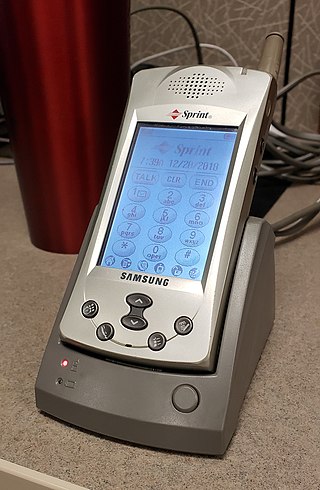Related Research Articles
Integrated Digital Enhanced Network (iDEN) is a mobile telecommunications technology, developed by Motorola, which provides its users the benefits of a trunked radio and a cellular telephone. It was called the first mobile social network by many technology industry analysts. iDEN places more users in a given spectral space, compared to analog cellular and two-way radio systems, by using speech compression and time-division multiple access (TDMA).

Bell Mobility Inc. is a Canadian wireless network operator and the division of Bell Canada which offers wireless services across Canada. It operates networks using LTE and HSPA+ on its mainstream networks. Bell Mobility is the third-largest wireless carrier in Canada, with 10.1 million subscribers as of Q3 2020.

AT&T Mobility LLC, also known as AT&T Wireless and marketed as simply AT&T, is an American telecommunications company. It is a wholly owned subsidiary of AT&T Inc. and provides wireless services in the United States. AT&T Mobility is the largest wireless carrier in the United States, with 217.4 million subscribers at the end of Q4 2022.
The Samsung SPH-i500 was a Palm OS-based smartphone manufactured by Samsung Electronics. It was previewed at CommunicAsia 2002 in June and launched later that year. It was later discontinued in August 2005. It was marketed in the United States for use on Sprint's mobile phone network.

WiBro is a wireless broadband Internet technology developed by the South Korean telecoms industry. WiBro is the South Korean service name for IEEE 802.16e international standard. By the end of 2012, the Korean Communications Commission intends to increase WiBro broadband connection speeds to 10Mbit/s, around ten times the 2009 speed, which will complement their 1Gbit/s fibre-optic network. The WiBro networks were shut down at the end of 2018.
Rogers Telecom Inc. is a subsidiary of Rogers Communications. It is a Canadian company based in Toronto that focuses on integrated communications as a provider of data, e-business and voice services to business and households. It used to be known as Sprint Canada Inc., pursuant to a 1993 branding agreement between parent Call-Net Enterprises Inc. with what is now Sprint Nextel Corporation.

Sprint Corporation was an American telecommunications company. Before being acquired by T-Mobile US on April 1, 2020, it was the fourth-largest mobile network operator in the United States, serving 54.3 million customers as of June 30, 2019. The company also offered wireless voice, messaging, and broadband services through its various subsidiaries under the Boost Mobile and Open Mobile brands and wholesale access to its wireless networks to mobile virtual network operators.
MOTO Talk is a feature on some Motorola iDEN cellular phone handsets which allows users to make short-range 'push-to-talk' calls to other such handsets without being on the iDEN network. This feature goes by different names on iDEN service providers. In the US, Nextel called it 'DirectTalk' and included it as a free service on most new models of Motorola handsets. Boost Mobile disabled the function via handset software settings. SouthernLINC calls it LINCaround and ships handsets with the feature disabled. It can be enabled after paying an activation fee of $20. In Canada, TELUS calls it "Mike's Talk-Around."

Solo Mobile is a discontinued mobile virtual network operator in Canada started by Bell Mobility in 2000. Historically, Solo was considered a discount wireless brand, offering low price monthly plans with some unlimited options in certain cities. Its products and services were only sold in British Columbia, Alberta, Ontario and Quebec. The brand ceased advertising towards new customers since November 2011, and new activations were officially discontinued on May 17, 2012.
The Samsung SPH-A640 is a tri-mode dual band cellular telephone developed for PCS carriers like Sprint Nextel in the United States and Virgin Mobile in Canada. It was released in mid to late 2006 in most areas in the United States and other countries such as Canada.
PowerSource, or "hybrid" phones, are specialized cellular devices used by customers of the American telecommunications company Sprint-Nextel. They are distinct from other mobile phones in that they make use of two cellular networks instead of a single one.

The Samsung SPH-M620 is a feature phone manufactured by Samsung. The phone is carried by Sprint Nextel in the United States, and by Bell Mobility, MTS, Telus and TBayTel in Canada. In Canada, the phone is sold as the M620 and the M620 Music Edition, with the Music Edition coming with high quality earphones and a 2 GB microSD card.

Nextel Communications, Inc. was an American wireless service operator that merged with and ceased to exist as a subsidiary of Sprint Corporation, which would later be bought by T-Mobile US and folded into that company. Nextel in Brazil, and formerly in Argentina, Chile, Peru, the Philippines, and Mexico, is part of NII Holdings, a stand-alone, publicly traded company not owned by Sprint Corporation.

The Samsung Instinct (SPH-M800) was an Internet-enabled smartphone designed and marketed by Samsung Mobile. It uses a Haptic touchscreen interface, and three touchscreen buttons. The Instinct, in addition to being a mobile phone, also functions as a camera phone, portable media player, text messenger, and a complete web browser and e-mail client. The email client allows for access to only the main inbox of any associated account – not to any subfolder. The folders for "drafts", "sent", "deleted", and "outbox" represent only messages originating from the phone.

The Samsung Moment, known as SPH-M900, is a smartphone manufactured by Samsung that uses the open source Android operating system.

The Samsung SPH-i300 was an early Palm OS-based PDA and smartphone manufactured by Samsung, released around August 2001 and marketed in the United States for use on Sprint's mobile phone network. It was the first "PDA phone" in the US with a color screen.
Clearnet was a division of Telus Mobility launched in April 2011 to sell landline and mobile phone bundles in Western Canada. It was a revival of the Clearnet Communications brand name, which originally belonged to an independent cellular provider that was merged into Telus Mobility in 2000. Telus relaunched Clearnet as a discount provider with a "limited market trial" in Kelowna, British Columbia and Red Deer, Alberta.
Voxer is a Dallas-based mobile app development company best known for its free Voxer Walkie Talkie app for smartphones.

The Motorola i920/i930 is Motorola's first wave of iDEN Protocol-based smartphones.
Boost Mobile is an American wireless service provider owned by Dish Wireless. It uses the Dish, AT&T and T-Mobile networks to deliver wireless services. As of Q2 2023, Boost Mobile, along with its sister brands Ting Mobile, Republic Wireless, and Gen Mobile, had 7.73 million customers.
References
- ↑ Bell Canada presentation on the 10-4 service - http://www.innovations.bell.ca/DATA/PRESENTATION/43/1_en.pdf